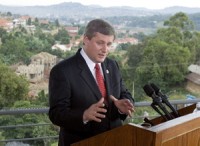By Alexander Panetta, The Canadian Press
Stephen Harper concluded a Commonwealth summit Sunday by bluntly describing the Kyoto accord as a mistake the world must never repeat. The prime minister characterized the landmark climate change deal as a flawed document and served notice that Canada will not support any new international treaty that carries its fatal flaw.
Harper said the key error of Kyoto was slapping binding targets on three-dozen countries but not the rest, including some of the world’s biggest polluters like the United States, China and India. So Canada will enter key negotiations on a post-Kyoto deal next month with a relatively simple position: all major polluters must be included, or there’s no deal.

Canadian Prime Minister Stephen Harper
By Natasha Courtenay-Smith and Morag Turner
Had Toni Vernelli gone ahead with her pregnancy ten years ago, she would know at first hand what it is like to cradle her own baby, to have a pair of innocent eyes gazing up at her with unconditional love, to feel a little hand slipping into hers - and a voice calling her Mummy.
But the very thought makes her shudder with horror. Because when Toni terminated her pregnancy, she did so in the firm belief she was helping to save the planet. Incredibly, so determined was she that the terrible “mistake” of pregnancy should never happen again, that she begged the doctor who performed the abortion to sterilise her at the same time.
He refused, but Toni - who works for an environmental charity - “relentlessly hunted down a doctor who would perform the irreversible surgery. Finally, eight years ago, Toni got her way. At the age of 27 this young woman at the height of her reproductive years was sterilised to “protect the planet”. “Having children is selfish. It’s all about maintaining your genetic line at the expense of the planet,” says Toni, 35. Read more here.
By Brian Rohan for Reuters
French towns worried about fuel prices, pollution and striking transport workers need look no further than the horse. Horses are a possible alternative for vehicles such as school buses and refuse trucks, say groups eager to pick up on global concerns about eco-friendly transport. “It’s all about sustainable development and bringing some humanity back to today’s monotonous, machine-driven jobs,” Stephane de Veyrac, from the French National Stud Organisation, said at this week’s annual conference of French mayors.
De Veyrac’s group says it is the first in France to offer consulting on a wide range of horse-powered vehicles that could also haul bottles and aid street sweeping. “It is a serious alternative—horses are already in use in over 70 towns as replacements for gasoline- and diesel-powered service vehicles,” said de Veyrac, pointing to the ‘Hippoville’ prototype parked in the exhibition hall. Read more here.


